- Home
- Donald Hamilton
Texas Fever Page 9
Texas Fever Read online
Page 9
Joe Paris frowned. “Listen, kid—”
Chuck said savagely, “Don’t talk fair play to me, hombre! When we get back home, I’ll be as fair as the next fellow. But Mr. Reese and anybody else up here who gets in the way is going to get just the break they gave the Old Man and no more, hear? I’m getting just a bit weary of burying McAuliffes; I’m going to start burying me a few Yankees for a change. . . . And after we’ve taken care of Mr. Reese, we’ll go after the cattle. If we play along now so these folks think we’re properly scared and there’s no harm in us . . . Well, if somebody jumps the outfit in the middle of the night down in the Territory somewhere, who’s to say it wasn’t a bunch of their own Yankee bushwhackers—particularly if there’s nobody left alive to talk? I’m kind of slow to learn, amigo, but I remember my lessons. If they can play it that way, so can I!”
He stopped, breathless, having gone somewhat farther than he’d intended. Grief and anger had carried him away; but now that he’d said it, he had no intention of backing away from it.
Joe was looking at him uneasily. “I know how you feel, boy, but I don’t think the Old Man would like—”
“The Old Man’s dead with a bullet in his back!” Chuck said harshly. “He wasn’t sneaky enough for these Kansas psalm-singers. He rode straight at them. I’m not making the same mistake; and if you don’t like it, you can make tracks for home!”
“Easy, kid,” Joe Paris said gently. “Take it easy. Don’t bite our heads off. We’re all with you.”
CHAPTER 15
Returning towards town, they were met by Sheriff Kincaid on a wiry little pony obviously of Indian origin. The sheriff sat his mount in the loose, careless, un-picturesque way of the old plainsman, to whom a horse was merely a means of getting from one place to another a little more rapidly and conveniently than by walking. Kincaid might have settled down in this farming community to raise a daughter and enforce the law, Chuck reflected, but he didn’t ride like any farmer who ever lived. This was a man who’d once spent some time in the places where the first thing you did each morning was to feel the top of your head to make sure your scalp was still on tight. It was something to remember.
‘'My condolences, Mr. McAuliffe,” the sheriff said, stopping before them. “Please believe that I regret what happened. Not that my regrets will bring him back.”
“No,” Chuck said.
Kincaid studied him for a moment, and shifted his gray eyes to look at the other men. A faint smile showed on his weathered face. “Nothing more unnatural-looking than a bunch of Texas vaqueros on foot,” he said with a change of tone. “You can pick up your horses and gear at Dance’s Livery, just down the street.”
Joe Paris asked, “What about our guns?”
“You’ll get them back when you leave these parts for good.” The sheriff turned back to Chuck. “I located your wagon and horse herd about six miles south of town,” he said, “and let your cook know what had happened. I suggest you send these men to wait for you in camp, Mr. McAuliffe, to avoid further trouble.”
“We’re making no trouble, Sheriff,” Chuck said.
Kincaid shrugged. “Whether you make it or somebody else, it’s still trouble, and my job is to prevent it. Send them out of town, son, so I can quit worrying about them. . . . Oh, and another thing. There’s a stranger named Paine at the hotel, who says he’s got a contract to supply beef to some Army posts. He was asking me about your cattle. I thought I’d let you know, since you’ll be trying to raise some money.”
Chuck looked up sharply, but the older man’s face seemed innocent of guile. “A stranger?” Chuck said. “I took him for a local citizen.”
“You’ve met him?”
“Why, yes,” Chuck said. “Your deputy brought him down to us, yesterday. Paine made my dad an offer of three dollars a head. The Old Man didn’t like it. That’s what set off the ruckus.”
Kincaid frowned. “Well, I didn’t know Will Reese was acquainted with the fellow; but then Will and I haven’t had much to say to each other since I bawled him out yesterday.” He sighed. “It’s made things kind of uncomfortable around the house, since the boy’s going to marry my daughter and she’s already taking his part; but it’s time Will learned that wearing a badge doesn’t entitle him to be quite so free with his fists and gun. . . . Ah, well, I don’t suppose any father ever found a young man good enough for his only female child.” He paused, and looked at Chuck narrowly. “You wouldn’t be trying to hint there’s something crooked between Will Reese and this cattle-buyer, would you, McAuliffe? Just because he brought the man down to talk to your dad?”
It was obvious that Jean Kincaid hadn’t repeated to her father much, if anything, of what she’d been told last night. Chuck hesitated. The sheriff saved him the trouble of finding an answer.
“If you are,” Kincaid said coldly, “you might as well go right ahead and call me a crook, too, young fellow. Because I’m advising you right now, if you haven’t the money to pay your fine, to go see Mr. Paine. I hate to say it, three dollars isn’t much, but it’s more than you’re likely to get if I have to auction off that herd of yours in the morning. Nobody around here’s likely to pay more than hide money for wild Spanish cattle that can’t legally be brought to market. I suggest you go talk to this Paine and see what kind of a proposition he’ll make you. Even
if his price is plain robbery, maybe you can sell off a couple of hundred head for enough to pay the judgment against you. Better than losing the whole herd.”
“All right,” Chuck said. "I'll talk to him.”
“And get these men out of town. I don’t want them hanging around getting drunk and quarrelsome.”
“Yes, sir,” Chuck said meekly. “I’ll see that they leave just as soon as they’ve got their horses.”
The sheriff regarded him a moment longer, clearly unconvinced by this show of tractability. He seemed about to make some further comment, but decided against it and rode away. Chuck watched him go, thoughtfully. Kincaid appeared to be an honest man. On the other hand, it was kind of odd, when you came to think of it, that every lawman in the region should be so dead set on having Mr. Paine get the cattle he wanted at the price he wanted to pay. . . .
CHAPTER 16
Back home, Jean Kincaid drew the living room curtains against the hot morning sun. Her father did not seem to have returned from the courthouse, where she’d seen him last; at least he didn’t answer her call. She stood in the semi-dusk of the room, pulling off her bonnet and gloves, aware of Will Reese closing the front door and coming towards her. She turned to face him, smiling.
“Well,” she said, “that’s that!”
He didn’t understand what she meant, of course; and he frowned slightly. Then, as she’d hoped he would, he took her in his arms and kissed her instead of asking questions. As always, his kiss was rough and demanding; but then, older women had warned her not to expect much consideration from any man, in this respect. It seemed to be generally agreed that men were all selfish and thoughtless where their pleasures were concerned; and Will, she had to admit, was certainly no exception to the rule. It was clear that her life as Mrs. Reese was going to be no sweet and romantic idyl such as one read about in the books considered suitable for young ladies.
Well, she’d never taken much stock in those silly stories, anyway, having been raised in a country where a story-book young lady who swooned in times of crisis wouldn’t be looked upon with much favor. As a girl, she’d seen her mother die with a Pawnee arrow in her back—had held her on the wagon seat, as a matter of fact, since her father had been too busy urging on the wildly running team. She’d seen too many weak and kindly men broken by the hardships of the frontier, leaving their families destitute, to be cared for by neighbors.
Life was one thing and book romances were another. Will Reese might not be much of a hand at gentle courting, but he was a good man and he would, she’d been assured by the ladies who’d taken it upon themselves to advise a motherless girl, make a fine husb
and and provider—and if she didn’t snap him up, there were other girls in town both ready and willing.
Anyway, she wasn’t made of glass, and there wasn’t any sense acting as if she’d break, even though she might have preferred a relationship based upon a little more . . . well, respect and dignity.
“Will!” she said sharply. She freed herself, and turned away to rearrange the bodice of her dress. “That . . . isn’t decent,” she said.
He was silent for a moment. She thought he was angry; then he laughed and came up behind her to put his big hands on her shoulders.
“What’s decent?” he murmured. “We’re to be married, aren’t we?”
“Well, wait until we are.”
“Waiting’s hard on a man,” he said, a little sulkily. Then he laughed again, and turned her around to face him. “You’re pretty when you’re mad, honey.”
“I’m not mad,” she said, smiling. After a moment, she said, teasingly: “As pretty as that little Mrs. Bristow staying at the hotel?”
Even as she said it, she’d have given a great deal to recall the words. She hadn’t intended to bring up the subject at all, but somehow it had slipped out—and in a way she was glad. It was hard enough, two people learning to live together, without making it worse with deceits and concealments, even well-meant and harmless ones.
She felt his hands leave her shoulders. When he spoke, his voice sounded puzzled. “Mrs. Bristow?”
She looked up at him sharply. “Will,” she said, “you’re not going to claim you never met the lady! Why, it’s all over town, and Bess Donohue, who was helping her father at the hotel desk last night, came over this morning to make quite sure I wouldn’t put any misinterpretation on your visit in the room. Wasn’t that kind and thoughtful of her? The little Irish alley-cat!”
“Oh,” he said. “Bristow. . . . I’d forgotten the name of Paine’s partner. Why, his wife seemed like a very charming lady, but a little high-toned for mere country folks like us. I found it hard to make conversation with her, waiting.” He laughed abruptly, looking down at her. “So that’s why you’ve been parading me around town this morning, honey!”
She flushed slightly. “Well, I didn’t want anyone to think I believed their nasty stories. Will,” she said, “who’s Mr. Paine?”
He shrugged his broad shoulders. “Just a man with whom I’ve done some business in the past.”
“And Mr. Bristow?”
“I told you, he’s Paine’s partner. They’re cattle-buyers. They . . . wanted to know the procedure, if these Texas cattle should be auctioned off; I think they might be interested in putting in a bid. I wasn’t quite sure about it myself, so I asked at the courthouse, and went over to tell them what I’d learned, afterwards, but they were out. Mrs. Bristow said they’d be right back. I waited a while —as a matter of fact, you can tell Bess Donohue I had a drink of whiskey; that should scandalize her properly —but they didn’t return, so I left. Is there anything else you’d like to know?” His voice had a sulky note again.
She said quickly: “I didn’t mean to sound as if I was cross-examining. . . . Will,” she said, “was it wise?”
“To have a drink with Mrs. Bristow?” He laughed. “Of course not. The way people in this town seem to stick their noses in everybody’s business, I should have taken to my heels the minute I realized the lady was alone!”
“I wasn’t referring to that,” she said. “But I see no reason for you to run errands for stray cattle-buyers. Can’t they get their own information at the courthouse?” He said, rather irritably, “I told you, Paine’s an old acquaintance. I saw no harm in doing him a favor.”
“I just mean—” She gestured towards the badge on his chest. “The law isn’t supposed to do people favors, my dear. Somebody might get the impression—”
His voice was suddenly harsh. “What impression?” “Well,” she said, “these Texans, for instance, already seem to have the idea that we wicked Yankees lie awake nights dreaming up new ways to victimize them. The young man who was here—of course, he was half-crazy with grief, not to mention the crack on the head—but he made all kinds of ridiculous and fantastic charges—”
“Charges?” Will demanded. “What charges?”
His tone was loud and unpleasant; and she had a sudden feeling that the scene was slipping out of control in a frightening way. What should have been merely something for them to laugh about tolerantly—the town’s proclivity for constructing outrageous gossip out of any material, no matter how flimsy—seemed to have led them into grim and desperate matters threatening their whole future together. The big man before her reached out and grasped her shoulders again, almost shaking her.
“What charges?” he cried.
“Will!” she protested, trying to free herself from his painful grip. “Please!”
He did shake her now. His face was ugly with rage. “Are you going to take the word of strangers and jealous females like Bess Donohue against mine?”
“But, my dear,” she said, aghast, “I wasn’t . . ."
Then she stopped, looking up at him in horror, seeing him clearly for the first time: a weak man, guilty and afraid. It came to her suddenly that everything that had been charged against him was probably true—and if it wasn’t, it could be. This was a man who could deliberately shoot another man in the back, whether he’d actually done so or not. This was a man who couldn’t be trusted with any pretty woman, if she gave him encouragement. Whether Mrs. Bristow had been complaisant or virtuous didn’t really matter; what mattered was that she could have had him if she’d wanted him. Any woman could have. . . .
“Let me go, Will,” she said quietly.
For a moment, she thought he was going to strike her. Then his hands dropped. “All right!” he cried. “All right, if you’re going to believe. . . !”
He didn’t finish the sentence, but turned and stormed out of the house, slamming the door behind him hard enough to rattle the pictures on the wall. After a little, she brought her hands up to rub the bruises his big hands had left on both shoulders. She stood like that, hugging herself as if cold, for a long time.
CHAPTER 17
Chuck McAuliffe watched the crew ride out of town reluctantly. After they’d gone out of sight, he swung about and started walking towards the square. Little boys looked after him wide-eyed, impressed by his big hat, Bowie knife, and high-heeled boots, but the adult glances he received were cold and unfavorable, reminding him that he was alone in enemy territory. The war might be over, but it wasn’t forgotten, whatever Sheriff Kincaid might claim.
At the hotel, he arranged for a room, since he could hardly impose on the sheriff and his daughter for another night. Asking a question, he was told that Mr. Paine had room number nine, down the hall to the right. Chuck hesitated, shrugged, and went down the indicated corridor—not that he expected to accomplish much of value there, but it would not hurt for him to be seen docilely following the sheriff’s advice.
Knocking on the door with the proper number, he received only silence for an answer. He rapped a second time, waited, and was about to turn and depart when the door of the adjoining room opened, and the thin, soberly clad figure of the cattle-buyer appeared, swaying. Obviously, his garments were all that was sober about Mr. Paine, at the moment.
“What the hell do you . . . Oh.” Paine frowned with an effort of concentration. “It’s young Mr. McAuliffe, is it not? My deepest sympathy in the matter of your bereavement, friend. In the midst of life, as the saying goes . . . What do you want?”
“I’d like to discuss some business with you, Mr. Paine.”
Paine steadied himself against the doorjamb. “Friend,” he said thickly, “I am, as you can certainly see, in no condition to discuss business, and in no mood, either. Now, if you had pleasure on your mind, Pythagoras Paine would be your man. . ." His voice grew suddenly sharp. “Come back in the morning. I’m busy. Good day.”
He started to retreat into the room, with dignity, and was about to shu
t the door in Chuck’s face, when a male voice from behind him said, “Let the young man come in.”
It was a voice that sounded familiar to Chuck, although he could not recall where he’d heard it. Mr. Paine looked startled. He turned his head. “But—”
“I said, let him in!”
Paine shrugged his shoulders helplessly and expansively, flung the door wide, and stumbled to one side. Chuck stepped forward, and stopped short inside the doorway. Facing him from the big chair was a tall, bearded figure that he might not have recognized even though the right leg was propped up on a low stool as if lame or injured—but there was no doubt of the identity of the smaller person who sat on the arm of the chair, with the man’s hand at her waist.
Chuck was aware of the clink of bottle against glass, to one side, as Mr. Paine helped himself to a fresh drink, but for a moment he had eyes only for the girl. She was very different in appearance from the smudged and trail-worn young lady he’d once kissed beside a campfire, at her own request. He could not imagine himself venturing to touch this stylish, silk-clad lady, although he could not help noting that the man he’d known as Netherton —though Chuck had seen him only once, in the dim interior of a wagon, it could be no other—seemed to have no similar qualms.
The position of the man’s hand, and its small, possessive, explorative movement along hip and thigh, was a familiarity no decent woman would have endured, certainly not in public. It made the relationship between them very clear, as well as the morality of the girl permitting the caress—not, Chuck reflected, that he needed any more evidence on this point, after her behavior that night. Honesty forced him to recall, however, that his own actions hadn’t precisely followed the rules of strict propriety, either. . . .

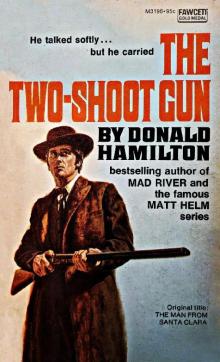 The Two-Shoot Gun
The Two-Shoot Gun Mad River
Mad River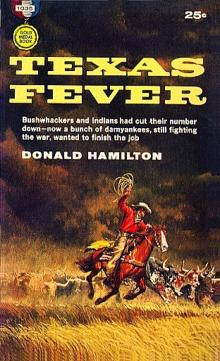 Texas Fever
Texas Fever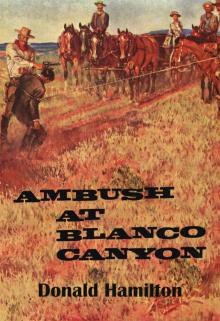 Ambush at Blanco Canyon
Ambush at Blanco Canyon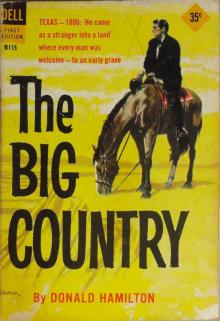 The Big Country
The Big Country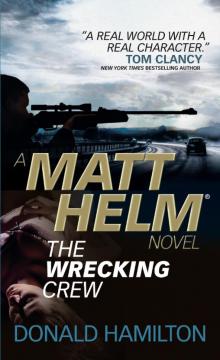 The Wrecking Crew
The Wrecking Crew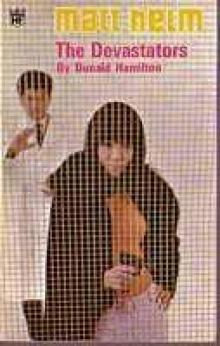 The Devastators mh-9
The Devastators mh-9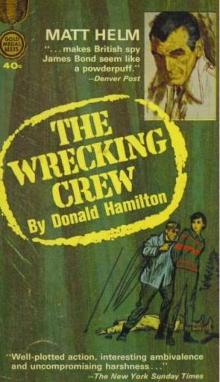 The Wrecking Crew mh-2
The Wrecking Crew mh-2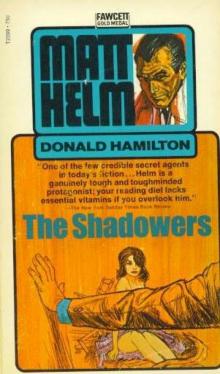 The Shadowers mh-7
The Shadowers mh-7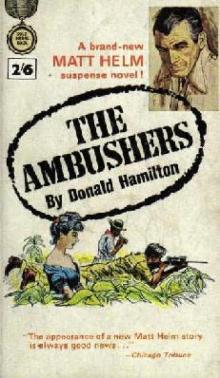 The Ambushers mh-6
The Ambushers mh-6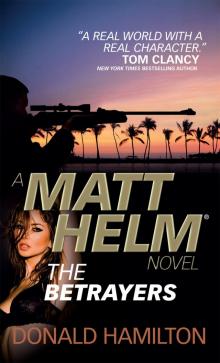 The Betrayers
The Betrayers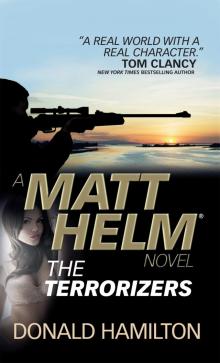 The Terrorizers
The Terrorizers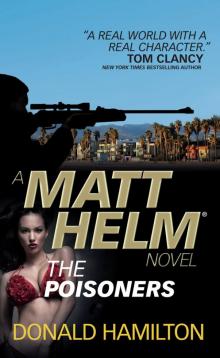 The Poisoners
The Poisoners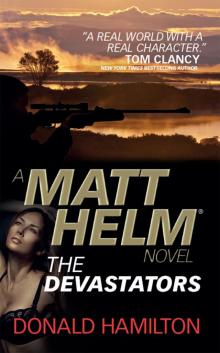 The Devastators
The Devastators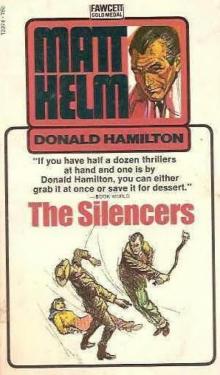 The Silencers mh-5
The Silencers mh-5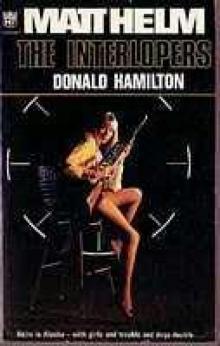 The Interlopers mh-12
The Interlopers mh-12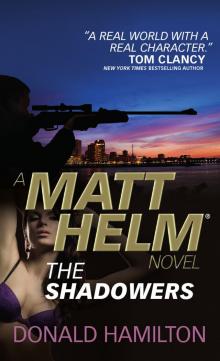 The Shadowers
The Shadowers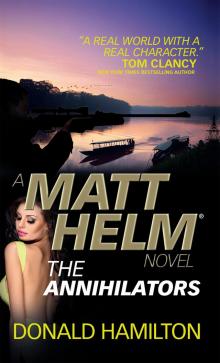 The Annihilators
The Annihilators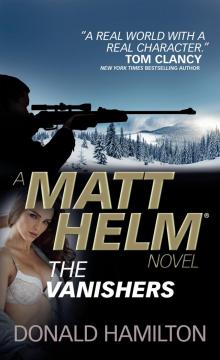 The Vanishers
The Vanishers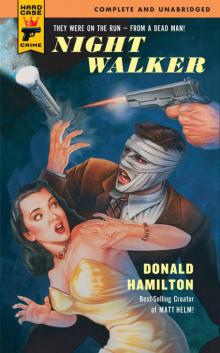 Night Walker
Night Walker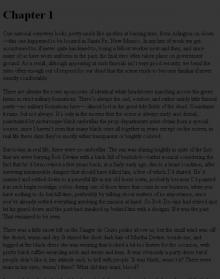 The Revengers
The Revengers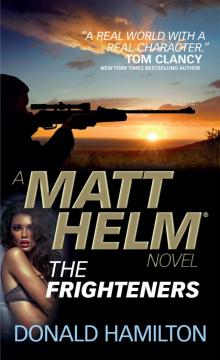 The Frighteners
The Frighteners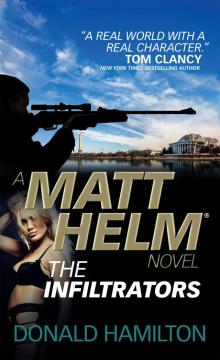 The Infiltrators
The Infiltrators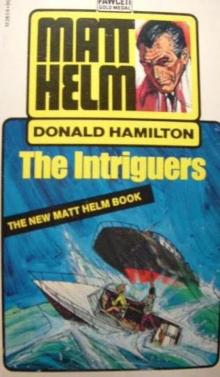 The Intriguers mh-14
The Intriguers mh-14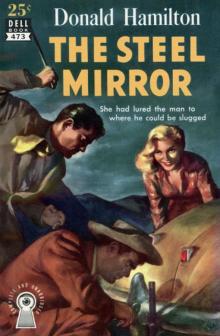 The Steel Mirror
The Steel Mirror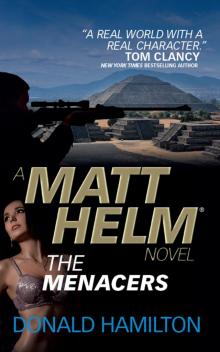 The Menacers
The Menacers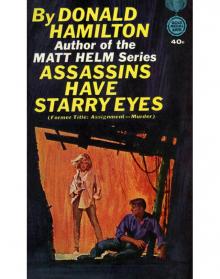 Assassins Have Starry Eyes
Assassins Have Starry Eyes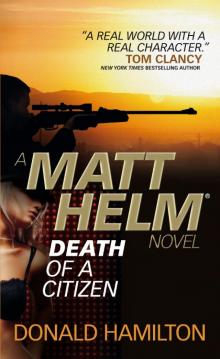 Death of a Citizen
Death of a Citizen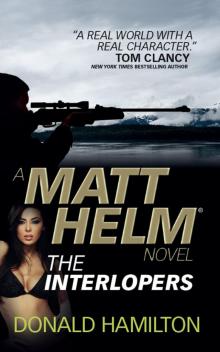 Matt Helm--The Interlopers
Matt Helm--The Interlopers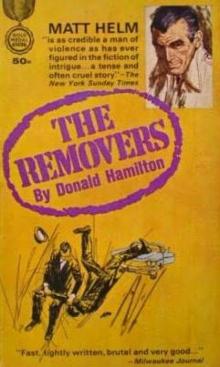 The Removers mh-3
The Removers mh-3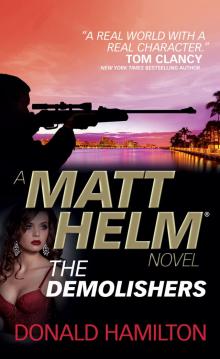 The Demolishers
The Demolishers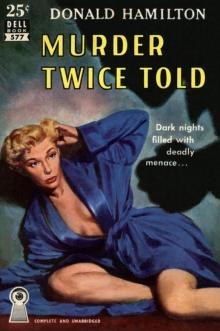 Murder Twice Told
Murder Twice Told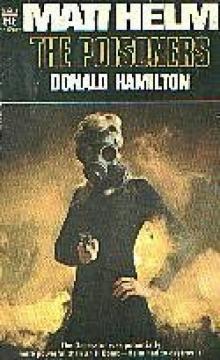 The Poisoners mh-13
The Poisoners mh-13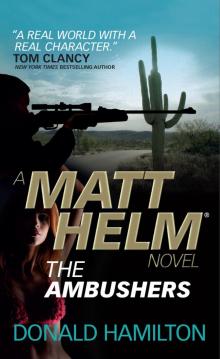 The Ambushers
The Ambushers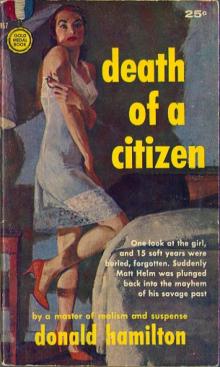 Death of a Citizen mh-1
Death of a Citizen mh-1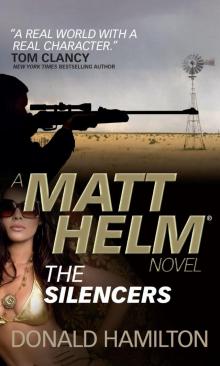 The Silencers
The Silencers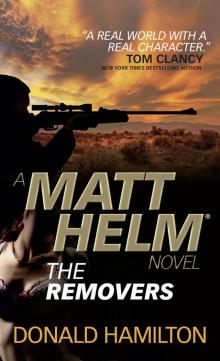 The Removers
The Removers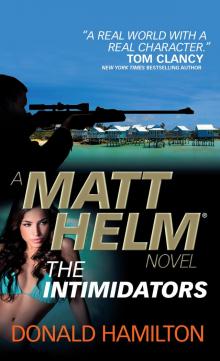 The Intimidators
The Intimidators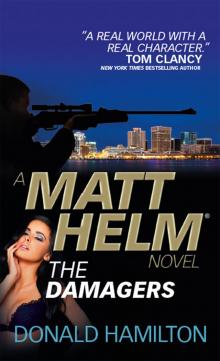 The Damagers
The Damagers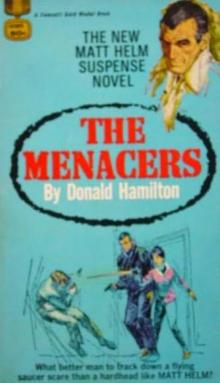 The Menacers mh-11
The Menacers mh-11 The Retaliators
The Retaliators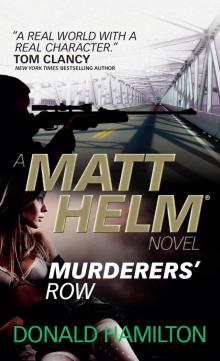 Murderers' Row
Murderers' Row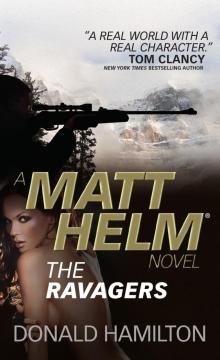 The Ravagers
The Ravagers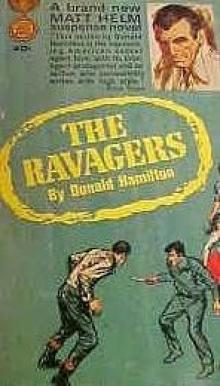 The Ravagers mh-8
The Ravagers mh-8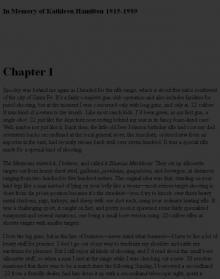 The Threateners
The Threateners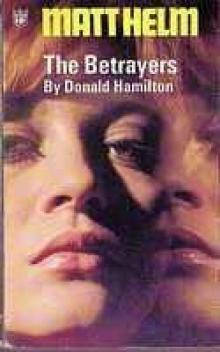 The Betrayers mh-10
The Betrayers mh-10